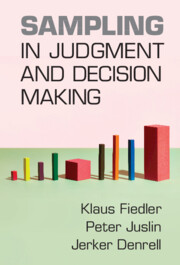Book contents
- Sampling in Judgment and Decision Making
- Sampling in Judgment and Decision Making
- Copyright page
- Contents
- Figures
- Tables
- Contributors
- Part I Historical Review of Sampling Perspectives and Major Paradigms
- Part II Sampling Mechanisms
- Part III Consequences of Selective Sampling
- Part IV Truncation and Stopping Rules
- Part V Sampling as a Tool in Social Environments
- Chapter 16 Heuristic Social Sampling
- Chapter 17 Social Sampling for Judgments and Predictions of Societal Trends
- Chapter 18 Group-Motivated Sampling
- Chapter 19 Opinion Homogenization and Polarization
- Part VI Computational Approaches
- Index
- References
Chapter 18 - Group-Motivated Sampling
From Skewed Experiences to Biased Evaluations
from Part V - Sampling as a Tool in Social Environments
Published online by Cambridge University Press: 01 June 2023
- Sampling in Judgment and Decision Making
- Sampling in Judgment and Decision Making
- Copyright page
- Contents
- Figures
- Tables
- Contributors
- Part I Historical Review of Sampling Perspectives and Major Paradigms
- Part II Sampling Mechanisms
- Part III Consequences of Selective Sampling
- Part IV Truncation and Stopping Rules
- Part V Sampling as a Tool in Social Environments
- Chapter 16 Heuristic Social Sampling
- Chapter 17 Social Sampling for Judgments and Predictions of Societal Trends
- Chapter 18 Group-Motivated Sampling
- Chapter 19 Opinion Homogenization and Polarization
- Part VI Computational Approaches
- Index
- References
Summary
Social interactions provide a large proportion of the information that people gather on a daily basis. The fundamental question guiding this chapter is whether and how social motivations influence the samples people gather, and how this drives downstream evaluative biases. We begin by highlighting how group-based motivations may influence three different stages of information processing: (1) where and how much information people gather, (2) how people interpret sampled information, and (3) how sampling strategies change recursively over time based on the congeniality of the environment. We then review recent empirical work that tests these possibilities using different social identities and contexts. Across seven studies we found that most participants began sampling from their own group, and that they sampled overall more information from their own group, giving rise to more variable ingroup (relative to outgroup) experiences. We also found that participants asymmetrically integrated their initial experiences into their evaluations based on congeniality: initial positive experiences were integrated into evaluations, whereas initial negative experiences were not. Lastly, we demonstrated that participants adopted different sampling strategies over time when the ingroup was de facto worse, obfuscating real-group differences. Together, we demonstrate that group-based motivations permeate each stage of information sampling, collectively giving rise to biased evaluations. These results unite extant research on sampling and interpretive sources of bias and provide a springboard for future research on sampling behavior across social motivations and contexts.
Keywords
Information
- Type
- Chapter
- Information
- Sampling in Judgment and Decision Making , pp. 417 - 435Publisher: Cambridge University PressPrint publication year: 2023
